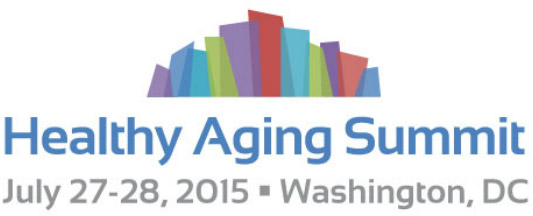2015 Healthy Aging Summit
Dates: July 27 – 28, 2015
Location: Washington, DC
The 2015 Healthy Aging Summit goals are to:
1. Explore the science on healthy aging;
2. Identify knowledge gaps that need to be filled;
3. Promote the role of prevention and preventive services in improving quality of life in later years; and
4. Mobilize action to improve the delivery of care for those aging in place or in transition.
2. Identify knowledge gaps that need to be filled;
3. Promote the role of prevention and preventive services in improving quality of life in later years; and
4. Mobilize action to improve the delivery of care for those aging in place or in transition.
The Summit goals will be reflected in the plenary sessions and should be addressed in submissions. Presentations that focus on collaboration with diverse partners and have international applications are encouraged.
Now is the time to examine the critical factors that contribute to healthy aging. Older Americans are a key part of our urban, rural and tribal communities as they have spent a lifetime contributing. Estimates of the U.S. population in 2010, revealed more than 40 million adults age 65 and older. By 2030, this figure is projected to increase to 72 million. Health care expenditures (both out-of-pocket costs and those covered by insurance) for Medicare beneficiaries over time are expected to rise for persons over 65 years of age. Encouraging healthy lifestyles, along with improving the delivery of preventive services, can help older Americans stay healthier longer and improve quality of life in later years.
Using a social determinants of health lens to focus on prevention in healthy aging. What are the upstream factors that contribute to living longer, healthier lives? This Summit seeks to highlight place-based interventions and strategies that optimize health and prevent entry into the health care system. A greater understanding of the social, environmental and emotional factors that influence health in the later years of life can improve quality of life and reduce health care costs.
Your work is part of this collective effort. HHS is seeking broad participation from diverse federal and non-federal subject matter experts across a multitude of disciplines. While public health and health care are key to understanding complex issues around aging, we recognize that there is much to learn from experts across sectors including transportation, environment, housing, justice, and faith-based partners, to name a few. Whether you are a clinician or health care consumer, public health official or constituent, educator or student, caregiver or care receiver, your involvement at this Summit will help to ensure that all Americans live longer, healthier lives.

No comments:
Post a Comment